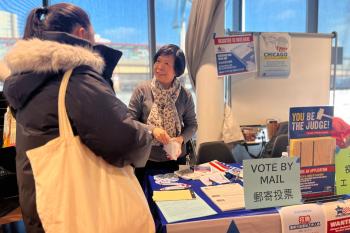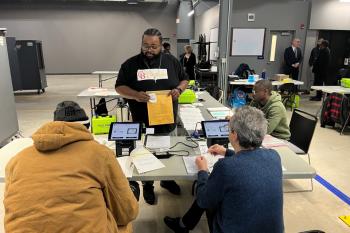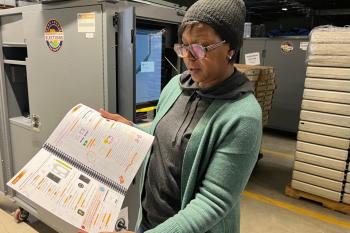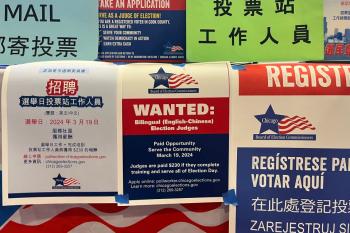
With Illinois’ March 19 primary approaching, election officials are ramping up efforts to recruit thousands to work the polls and be on the frontlines to “keep democracy going.”
And, they say, the stakes couldn’t be higher for their recruiting efforts.
“We need help, real help, to prop up democracy. Because if we don’t get the election judges there, it allows these other factors to win,” Ed Michalowski, the Cook County deputy clerk of elections said. “When good people could serve as election judges, and they don’t, it allows for some of that negativity to creep in, and some of those false statements and some of those false expressions on the internet.”
But finding enough workers has become increasingly challenging. A downturn in recruitment from political parties has shifted the onus onto government agencies to find poll workers, changes in elections and voting patterns require new training each year and an increase in threats and harassment is plaguing workers nationwide. More than half of jurisdictions reported last year that it was difficult to recruit poll workers, according to a report from the U.S. Election Assistance Commission.
Election officials are quick to acknowledge the drawbacks of the job that can make positions so tough to fill, even while emphasizing their importance.
“It’s long hours, it’s not much pay for those long hours, and you are at the center of what can be a very politically fraught day,” said Max Bever, a spokesman for the Chicago Board of Elections.
Through “The Democracy Solutions Project,” WBEZ, the Chicago Sun-Times and the University of Chicago’s Center for Effective Government at the Harris School of Public Policy are examining the challenges to our democracy and potential solutions in the lead up to the 2024 presidential election.
Election officials around the Chicago region have tried to find workarounds to address voter apathy and incentivize residents to serve, such as increasing pay, tapping groups such as veterans and high school students and simply making elections function with fewer workers.
“The way that the election code is written is that election judges really are the heart of the democratic process. We need a certain number of them. We need them to declare a party. We need them to be there for the whole day,” Bever said. “And when we can’t get enough judges, election day doesn’t run as smoothly.

Incentives to recruit poll workers
At the Cook County Clerk’s Election Operations Center in Cicero, rows and rows of 1,430 large metal boxes that hold voting equipment for election day sit at the ready to be shipped to each precinct across the suburbs.
“It always reminds me of the Indiana Jones first movie when they’re going with the Ark of the Covenant and the warehouse keeps going and going and going,” Michalowski said.
But the sheer scale of the operations can be daunting. Ideally, each precinct would have five election judges — meaning the county needs 7,150 election judges alone who have to be trained. There’s also poll workers who work on mail ballots, early voting and election technicians in the field, adding up to roughly another 900 workers.
While the November presidential election can help boost interest — about 4,700 people had already signed up to serve as election judges by early January — Michalowski estimates they won’t have enough election judges to be fully staffed at each precinct.
“We’ll have at least three people in every precinct which is manageable — not perfect, but manageable,” Michalowski said.
In Chicago, about 6,500 election judges are needed, a dramatic decrease from the roughly 11,000 that were needed nearly two years ago before the number of precincts were reduced by 40%.
“The only reason we were able to fully staff our last three election days in Chicago fully was because of precinct consolidation,” Bever said. “I won’t say that it’s a magic button, that precinct consolidation is the one solution to election judge recruitment woes. But it was extraordinarily helpful even if it was a bold decision.”
Election authorities also aim to have backup judges to combat resignations and no-shows that could lead to polls not opening on time. Recruitment can be even harder in odd-year elections or when there’s a change to the election timetable — such as 2022’s March primaries being moved to June to accommodate delayed U.S. Census data.
To incentivize residents to serve, some election authorities have increased pay. This year, Cook County polling place technicians will make $400, a $15 increase from last year, and election judges will be paid $250. In Chicago, new election judges can make up to $230, with additional pay for taking on more responsibilities, and election coordinators who require more training are paid $450.

Illinois law requires election judges from both political parties be present, and as the power of the committeeperson has waned in Chicago politics, recruitment from local ward organizations has fallen along with it, election authorities said. Instead, they’ve made a push for groups such as veterans and students to fill the gaps. In the last three elections held in Chicago, nearly 20% of the election judge workforce was high school or college-aged students, Bever said.
A bill sponsored by state Rep. Daniel Didech, D-Buffalo Grove, would allow college students to earn academic credit for serving as an election judge rather than getting paid. It passed the House of Representatives 100-12, but has not been voted on in the Senate.
“Our counties and our municipalities that have election authorities have lots of budget pressures in a lot of different directions,” Didech said. “So if this can be a tool to expand the number of election judges we have without a fiscal impact to those election authorities, I think that’s obviously a good thing.”
Poll workers find the work rewarding
Working the polls helped demystify the voting process for Austin resident LaShaone Hatchett and show her how her vote counts.
“The more you know about it, the less you fear it,” Hatchett said. “It quells all of the…concerns that people may have with the security of it…You’re able to bridge that connection between a voter and the election process and the final results.”
The newfound knowledge and sense of serving her community brought her back each election season. Now, she serves as lead election judge trainer helping other Cook County poll workers gain confidence in the process, like how to navigate conflict, and reminds trainees everything they need to know is in the manual.

It’s a similar sense of civic duty that spurs people to Jane Lau, a Chicago Board of Elections community services representative, who recently recruited bilingual poll workers at the Chinatown branch of the Chicago Public Library.
“The job is challenging, but it’s really rewarding,” Lau said as she made her pitch, listing Cantonese and Mandarin speakers among those needed.
There are hundreds of precincts that need bilingual judges to help voters who need language support, although the number of precincts receiving language assistance declined as a result of precinct consolidation. The Chicago Board of Elections has recorded podcasts in languages like Hindi to make its pitch, and last year, over 70% of the roughly $540,000 media budget went toward advertising in ethnic media publications, Bever said.
For Brighton Park resident Xi Hui Jiang, the desire to work as an early voting official in his retirement to help Chinese voters with translations, was simple.
“I want to do something new to help society,” Jiang said.
Tessa Weinberg covers Chicago government and politics for WBEZ.
